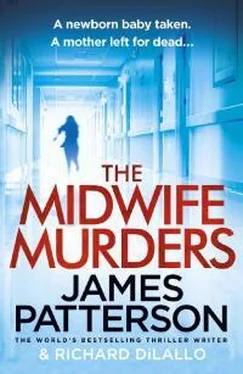“Oh, come on, Lucy. For me?”
But before he can say something like “Aw, c’mon, sweetie pie. Pretty please with sugar on it?” I say, “Gotta run. New member of the human race is on the way.”
CHAPTER 11
FENDING OFF RUDI SARKAR’S arrogant request was a small challenge compared to the problem waiting for me in birthing room 3. Tracy Anne and I move quickly toward the room. Even after years of delivering babies, I still always feel the happy anticipation when a mother is about to bring a new life into this world.
Katra Kovac has quite a few obstacles facing her in the next few hours—a young, first-time mother and recent immigrant, I think from Eastern Europe, and there’s no sign of the baby’s father. But Katra is strong, healthy, and enthusiastic, with the full support of her mother and father.
I follow Tracy Anne into the room. It’s empty. What the hell? No nurse, no other midwives, most alarmingly, no Katra Kovac.
“Tracy Anne, is this the wrong room number?”
“No, I’m sure this is the right room. We were assigned to birthing 3. Emergency Registration was bringing her up when I went out to get you.”
“Well, there’s some screwup,” I say, and I’m hoping that’s all it is—a simple screwup.
Tracy Anne and I head quickly toward the nurses’ station. I’m certain we’re both thinking the worst: have we escalated from missing babies to missing mothers?
My usual good luck: Nurse Charming, Deborah Franklin, is on duty at the central desk.
“Where’s the patient who’s supposed to be in birthing room 3, Katra Kovac? I can’t find her,” I say.
“Did you look in the bed?” Franklin says.
I’m in no mood for Franklin’s sarcasm right now. “Do you know where Katra Kovac is?” I say slowly and loudly. “Did you see her brought up from Registration?”
“I surely did. She was there a few minutes ago. In fact, one of your people was with her.”
“Who was it?”
“I wasn’t watching,” says Nurse Franklin.
I don’t have time for bullshit. I spring into action. “Let’s start looking, Trace,” I say.
Tracy Anne and I each take a side of the hospital corridor. We scurry unannounced into patients’ rooms, bathrooms, visitors’ lounges, even an archaic room with a small brass sign on it that says FATHERS’ WAITING ROOM. We look in custodian closets and the food storage rooms that hold the thousands of packets of peanut-butter crackers, Jell-O cups, and apple juice.
Now I’m a bit frightened. Okay, I’m really frightened.
“What should we do?” Tracy Anne asks.
“What do you think? We keep looking, and we call for backup.”
We rush to the nurses’ station. I tell Nurse Franklin to call Security.
“I already have,” she says. “They’re on their way.”
Two men from GUH Security appear almost instantaneously. I know these two guys, but I certainly do not know the other two people with them: a uniformed NYC female cop and a grumpy-looking guy in a rumpled gray suit. The woman looks ready to work. The guy looks just the opposite: sullen, tired. He has one of those slightly paunchy dad bods. He’s got to be the detective.
“I’m Detective Leon Blumenthal, NYPD.” Was I right or was I right? “This is Officer Cindy Hazard. Let’s get started.”
Apparently he doesn’t care to know our names. I don’t even try.
“Missing person is seventeen, dark blond hair, wearing hospital gown,” he says. “Let’s search this floor first.”
“We’ve already done that,” I say.
“And you are …?”
I guess he’s changed his mind. He does want an intro. “Midwife Lucy Ryuan.”
“And you found nothing and no one?”
“Well, we certainly didn’t find Katra Kovac.”
“Well, why don’t we just take one more crack at it. I already have a team moving hard through the hospital,” he says. “Let’s go.”
Forget paunchy and tired. I’ll call him arrogant as shit.
CHAPTER 12
WITHIN MINUTES, TRACY ANNE and I have joined the search with Blumenthal and his colleagues, or maybe they even forgot we were there with them. Either way, we’re tagging along with the crew through Adult Neurosurgery and ICU. I don’t exactly know what Blumenthal and company are doing that’s so different from what Tracy Anne and I were doing fifteen minutes ago. They pull open drawers and look under beds. They go into bathrooms and knock on stall doors. Could it be that their flashlights make them seem professional?
There aren’t many good places to hide in a hospital—no matter what you’ve seen on television. Sure, a supply closet, a visitors’ bathroom, an occasional doctor’s vacant office. But for the most part, the spaces are all very wide corridors and lots of rooms for patients.
“That’s a janitor’s closet,” I say as NYPD officer Cindy Hazard opens a janitor’s closet, the same one I’d opened fifteen minutes ago. Hazard and Blumenthal step into the closet.
Okay, moving right along.
We finish searching Adult Neurosurgery and ICU. We head for the Darlow Pavilion, a fancy area of the hospital with marble floors and dark wood-paneled private rooms. I explain to Blumenthal that the Darlow Pavilion was designed for super-rich patients willing to pay a lot of money for being sick in absolute privacy and luxury. Darlow is a cash cow for Gramatan, and most patients in Darlow are not used to being disturbed by anyone except their masseurs and stockbrokers. Blumenthal and his gang don’t seem to care. We look in. We move on. Now we’re running out of places to look.
We are walking toward the huge physiotherapy rehab room when Blumenthal gets a message on his cell phone. He reports that another police search group think they may have located the “possible MP Kovac.” He says, “The victim is in a basement storage room.”
Why did he use the word victim ?
Now I’m nervous as shit. This isn’t a game. This is real.
We run for the elevator. Blumenthal tells us we’re headed for Mechanical Storage and Lab. It’s an area of the hospital I know nothing about. As we run, Blumenthal gets another text. They report that MP Kovac is seriously injured.
During the brief elevator ride, Blumenthal speaks directly to me. “My team says that this storage room is pretty grim. Have you ever been down there?”
“No,” I tell him. “I think it’s probably just where they keep old equipment like out-of-date x-ray machines, filing cabinets, that sort of stuff.”
The elevator arrives in the basement. We exit and quickly survey the area. The basement is vast. Its ceiling is low, and the very tall Detective Blumenthal has to tip his head forward to avoid lighting fixtures. Long corridors crisscross one another. Two NYPD officers quickly escort us to an open door.
Grim? They said the room was grim?
The harsh lighting, the putrid odors. The room sure is grim . But that’s only the beginning.
CHAPTER 13
OUR EYES BURN. OUR throats gag. The storage room is filled with three or four more cops and two men I recognize from GUH Security. We enter a miserable scene: small puddles of filthy, stinky liquid on the floor, dripping, oozing pipes running along the ceiling. The smell is an overpowering mixture of bathroom antiseptic and human or animal feces. Handkerchiefs go to faces, and a tough-looking NYPD officer vomits almost immediately. It is totally out of keeping with the high standards of you-can-eat-off-the-floor cleanliness practiced by GUH.
Two huge MRI machines are pushed up against big old-fashioned x-ray units, twenty-foot-long chunks of steel with worn leather and dirty plastic. Someone more creative than me might see this mash-up as a fascinating art installation, the absurd landscape of a foul medical junkyard, or props from a horror movie.
Читать дальше












